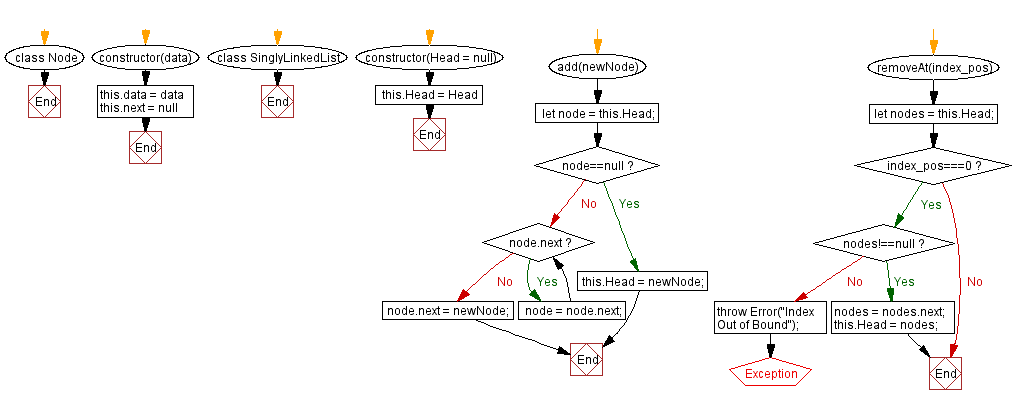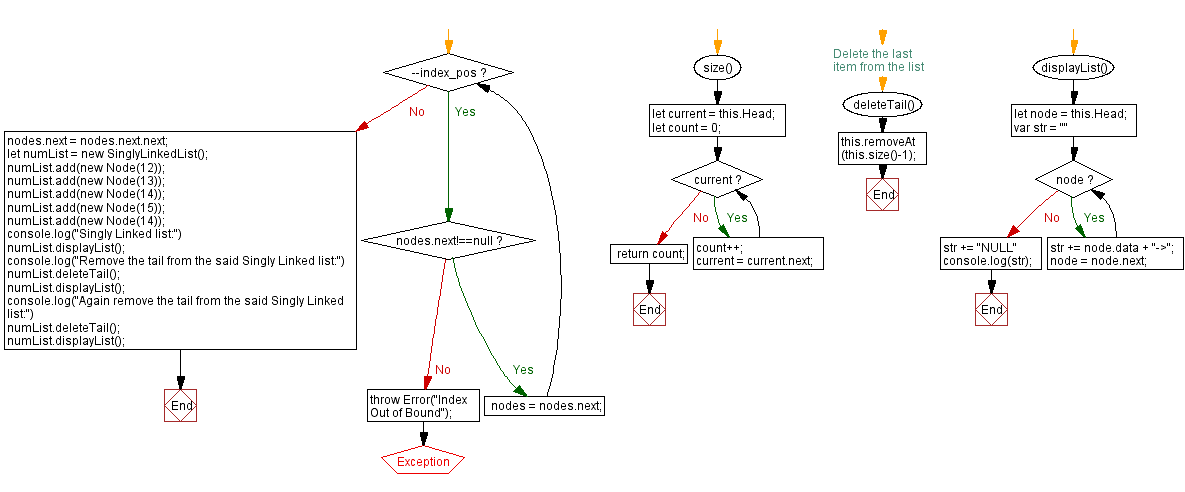JavaScript Exercises: Remove the tail element from a Singly Linked list
JavaScript Singly Linked List: Exercise-14 with Solution
Remove the tail element from a SLL
Write a JavaScript program that removes the tail element from a Singly Linked list.
Sample Solution:
JavaScript Code:
// Define a class representing a node in a singly linked list
class Node {
constructor(data) {
// Initialize the node with provided data
this.data = data;
// Initialize the next pointer to null
this.next = null;
}
}
// Define a class representing a singly linked list
class SinglyLinkedList {
constructor(Head = null) {
// Initialize the head of the list
this.Head = Head;
}
// Method to add a new node to the end of the list
add(newNode) {
// Start traversal from the head node
let node = this.Head;
// If the list is empty, set the new node as the head and return
if (node == null) {
this.Head = newNode;
return;
}
// Traverse the list until the last node
while (node.next) {
node = node.next;
}
// Set the next pointer of the last node to the new node
node.next = newNode;
}
// Method to remove a node at a specified index position
removeAt(index_pos) {
// Start traversal from the head node
let nodes = this.Head;
// If index position is 0, remove the head node
if (index_pos === 0) {
if (nodes !== null) {
nodes = nodes.next;
this.Head = nodes;
} else {
throw Error("Index Out of Bound");
}
return;
}
// Traverse the list until the previous node of the node to be removed
while (--index_pos) {
if (nodes.next !== null) {
nodes = nodes.next;
} else {
throw Error("Index Out of Bound");
}
}
// Remove the node by skipping its reference in the list
nodes.next = nodes.next.next;
}
// Method to get the size of the list
size() {
let current = this.Head;
let count = 0;
// Traverse the list and count the number of nodes
while (current) {
count++;
current = current.next;
}
return count;
}
// Method to delete the last item from the list
deleteTail() {
// Call removeAt method to remove the node at the last index position
this.removeAt(this.size() - 1);
}
// Method to display the elements of the list
displayList() {
// Start traversal from the head node
let node = this.Head;
// Initialize an empty string to store the elements of the list
var str = "";
// Traverse the list and concatenate each element to the string
while (node) {
str += node.data + "->";
node = node.next;
}
// Append "NULL" to indicate the end of the list
str += "NULL";
// Print the string containing the list elements
console.log(str);
}
}
// Create an instance of the SinglyLinkedList class
let numList = new SinglyLinkedList();
// Add nodes with data values to the list
numList.add(new Node(12));
numList.add(new Node(13));
numList.add(new Node(14));
numList.add(new Node(15));
numList.add(new Node(14));
// Display the elements of the list
console.log("Singly Linked list:");
numList.displayList();
// Remove the last element from the list
console.log("Remove the tail from the said Singly Linked list:");
numList.deleteTail();
numList.displayList();
// Again remove the last element from the list
console.log("Again remove the tail from the said Singly Linked list:");
numList.deleteTail();
numList.displayList();
Output:
Singly Linked list: 12->13->14->15->14->NULL Remove the tail from the said Singly Linked list: 12->13->14->15->NULL Again remove the tail from the said Singly Linked list: 12->13->14->NULL
Flowchart:


Live Demo:
See the Pen javascript-singly-linked-list-exercise-14 by w3resource (@w3resource) on CodePen.
For more Practice: Solve these Related Problems:
- Write a JavaScript function that traverses a singly linked list to remove the last node and updates the tail pointer.
- Write a JavaScript function that recursively finds and removes the tail node of a singly linked list.
- Write a JavaScript function that handles removal of the tail element when the list has only one node.
- Write a JavaScript function that removes the last element from a singly linked list and returns the updated list.
Go to:
PREV : Remove the first element from a SLL.
NEXT : Convert a SLL into an array.
Improve this sample solution and post your code through Disqus
What is the difficulty level of this exercise?
Test your Programming skills with w3resource's quiz.
